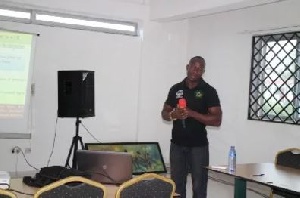 Mr Adamu Mukaila, Civil Society Advisor of SEND Ghana
Mr Adamu Mukaila, Civil Society Advisor of SEND Ghana
Mr Adamu Mukaila, Civil Society Advisor of SEND Ghana, has said that poor attitude of health professionals contributes to some patients being maltreated and disregarded of their rights in the country.
He explained that discrimination and stigmatization against vulnerable groups including (Key Populations) KPs, women, and youth, weak capacity of CSOs and CBOs to demand accountability for quality service delivery, lack of awareness on Patients’ Rights contributed to the abuse of rights of some patients.
“If civil society is strengthened in a way that increases citizen input into Ghana’s health and HIV development process, then Ghana’s health system will be more participatory and responsive to the needs of the beneficiary population and our interventions will work towards achieving USAID goal of Equitable Improvements in Health Status”.
Mr Mukaila said this at a two-day workshop on the USAID funded People for Health (P4H) Project organised by the Ghana News Agency (GNA).
The five-year P4H Project-March 2016- March 2021 would ensure improved access to quality health service delivery for citizens in 20 districts selected from four regions- Greater Accra, Eastern, Northern and Volta Regions.
It also seeks to strengthen organisational and institutional capacities of government and civil society organisations (CSOs) for mutual accountability in health, HIV, water, sanitation and hygiene, family planning and nutrition policy formulation and implementation.
The project- being implemented by a consortium of three organisations led by SEND-Ghana, a non-governmental organisation (NGO), with Penplusbytes another NGO and the Ghana News Agency as partners, thrives for leverage opportunities for change, building on consortium members’ existing good relations with local governments, District Health Management Teams and the USAID ongoing initiatives in the health sector.
Mr Muakaila mentioned service standards and key policy and programs, social cultural practices that create conditions for stigmatization and discrimination against vulnerable groups especially KPs as some of the factors that make it difficult for vulnerable groups to access key health services, especially in the rural areas.
He explained that there were numerous challenges affecting healthcare delivery in Ghana, which needed timely interventions to revert the situation, adding that Ghana was yet to comply with the Abuja Declaration.
He said there was the need for West African governments to comply with the Abuja Declaration and spend a minimum of 15 per cent of their annual budgetary resources on the health sector.
Mr Mukaila envisaged that by the end of the project a critical mass of CSOs and communities in the targeted districts would have advocated for inclusive and improved access to health care.
Mr George Osei-Bimpeh, Country Director of SEND-Ghana, expressed satisfaction with the partnership so far, and pledged further support to facilitate the successful implementation of the project.
He urged the media to intensify and sustain their advocacy and sensitisation role for the protection of human rights in all spheres of life and called for coordinated effort to ensure a successful health care delivery system.
Mr Kwabena Tarbiri of Penplusbytes who took participants through the Dashboard developed for the project, said his outfit was training health service providers, citizens and key populations including people living with HIV and AIDS to use a technology platform to engage and send feedback to each other about access to and quality of health services.
The platform developed for the project would provide and share information on maternal and child health, family planning, reproductive health, malaria, water, sanitation and hygiene, nutrition and HIV/AIDS health service delivery at the district, regional and national levels.
It is also to provide a non-human interface means of reporting cases of stigmatization and discrimination in receiving proper health care especially among key populations and people living with HIV/AIDS.
Mr Tabiri noted that the platform secured the anonymity of users whilst reporting cases; how it engages users and provided time-tested means of getting useful feedback and action for improved health services from the appropriate sources.
“The technology is user friendly and it is basic enough for every citizen to use with ease,” he said.
Penplusbytes in partnership with the Commission on Human Rights and Administrative Justice (CHRAJ) will appraise an existing online platform for reporting stigma and discrimination against people living with HIV/AIDS and Key Populations (KPs) who include guys, lesbians and prostitutes.
Mrs Linda Asante-Agyei, P4H Project Manager for the Ghana News Agency who took participants through the role of the Agency and Media and Communication Advocacy Network (MCAN) on the project said journalists would effectively and consistently investigate and disseminate stories that would help KPs, and Persons Living with HIV and AIDs advocate and demand for effective health service delivery.
She explained that GNA reporters and MCAN members in the implementing districts would work closely with District Citizens Monitoring Committees to identify issues, monitor commitments and compliance with service, standards by the necessary health authorities and report on them.
She urged participants to be well equipped enough to identify the issues in the communities, report on them and ensure that “our stories hold government accountable and at the same time citizens become conversant with the Patients Charter and the Code of Ethics to enable people demand what is rightfully due them”.